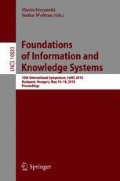Abstract
A profile describes a set of skills a person may have or a set of skills required for a particular job. Profile matching aims to determine how well the given profile fits the requested profile. Skills are organized into ontologies that form a lattice by the specialization relation. Matching functions were defined based on filters of the lattice generated by the profiles. In the present paper the ontology lattice is extended by additional information in form of so called extra edges that represent some kind of quantifiable relationship between skills. This allows refinement of profile matching based on these relations between skills. However, that may introduce directed cycles and lattice structure is lost. We show a construction of weighted directed acyclic graphs that gets rid of the cycles, and then present a way to use formal concept analysis to gain back the lattice structure and the ability to apply filters. We also give sharp estimates how the sizes of the original ontology lattice and our new constructions relate.
The research of the first author of this paper has been partly supported by the Austrian Ministry for Transport, Innovation and Technology, the Federal Ministry of Science, Research and Economy, and the Province of Upper Austria in the frame of the COMET center SCCH.
Access this chapter
Tax calculation will be finalised at checkout
Purchases are for personal use only
Notes
- 1.
The concept lattices were generated using the Concept Explorer tool. Web page: http://conexp.sourceforge.net/.
References
European Dictionary of Skills And Competences. http://www.disco-tools.eu
International Standard Classification of Education. http://www.uis.unesco.org/Education/Pages/international-standard-classification-of-education.aspx
International Standard Classification of Occupations (2008)
Buitelaar, P., Cimiano, P., Magnini, B.: Ontology learning from text: an overview. Ontol. Learn. Text: Methods Eval. Appl. 123, 3–12 (2005)
Choi, S.S., Cha, S.H., Tappert, C.C.: A survey of binary similarity and distance measures. J. Systemics Cybern. Inf. 8(1), 43–48 (2010)
Cimiano, P., Hotho, A., Staab, S.: Learning concept hierarchies from text corpora using formal concept analysis. J. Artif. Intell. Res. (JAIR) 24(1), 305–339 (2005)
Di Noia, T., Di Sciascio, E., Donini, F.M.: Semantic matchmaking as non-monotonic reasoning: a description logic approach. J. Artif. Intell. Res. (JAIR), 29, 269–307 (2007)
Ganter, B., Kuznetsov, S.O.: Stepwise construction of the Dedekind-MacNeille completion. In: Mugnier, M.-L., Chein, M. (eds.) ICCS-ConceptStruct 1998. LNCS, vol. 1453, pp. 295–302. Springer, Heidelberg (1998). https://doi.org/10.1007/BFb0054922
Ganter, B., Stumme, G., Wille, R. (eds.): Formal Concept Analysis. LNCS (LNAI), vol. 3626. Springer, Heidelberg (2005). https://doi.org/10.1007/978-3-540-31881-1
Ganter, B., Wille, R.: Formal Concept Analysis: Mathematical Foundations. Springer Science & Business Media, Heidelberg (2012)
Hájek, P.: Mathematics of Fuzzy Logic. Kluwer Academic Publishers, Dordrecht (1998)
Lau, T., Sure, Y.: Introducing ontology-based skills management at a large insurance company. In: Proceedings of the Modellierung, pp. 123–134 (2002)
Levandowsky, M., Winter, D.: Distance between sets. Nature 234(5), 34–35 (1971)
Liu, L., Li, K.: Fuzzy filters of bl-algebras. Inf. Sci. 173(1), 141–154 (2005)
Looser, D., Ma, H., Schewe, K.D.: Using formal concept analysis for ontology maintenance in human resource recruitment. In: Proceedings of the Ninth Asia-Pacific Conference on Conceptual Modelling, Vol. 143, pp. 61–68. Australian Computer Society Inc. (2013)
Maedche, A., Volz, R.: The ontology extraction & maintenance framework text-to-onto. In: Proceedings of the Workshop on Integrating Data Mining and Knowledge Management, USA, pp. 1–12 (2001)
Martínez Gil, J., Paoletti, A.L., Rácz, G., Sali, A., Schewe, K.D.: Accurate and efficient profile matching in knowledge bases (2017, submitted for publication)
Popov, N., Jebelean, T.: Semantic matching for job search engines–a logical approach. Technical report 13-02, Research Institute for Symbolic Computation. JKU Linz (2013)
Rácz, G., Sali, A., Schewe, K.-D.: Semantic matching strategies for job recruitment: a comparison of new and known approaches. In: Gyssens, M., Simari, G. (eds.) FoIKS 2016. LNCS, vol. 9616, pp. 149–168. Springer, Cham (2016). https://doi.org/10.1007/978-3-319-30024-5_9
Ragone, A., Straccia, U., Di Noia, T., Di Sciascio, E., Donini, F.M.: Fuzzy matchmaking in e-marketplaces of peer entities using Datalog. Fuzzy Sets Syst. 160(2), 251–268 (2009)
Shamsfard, M., Barforoush, A.A.: The state of the art in ontology learning: a framework for comparison. Knowl. Eng. Rev. 18(4), 293–316 (2003)
Wu, F., Weld, D.S.: Automatically refining the wikipedia infobox ontology. In: Proceedings of the 17th International Conference on World Wide Web, pp. 635–644. ACM (2008)
Wygralak, M.: Cardinalities of Fuzzy Sets. Springer, Heidelberg (2003)
Ziebarth, S., Malzahn, N., Hoppe, H.U.: Using data mining techniques to support the creation of competence ontologies. In: AIED, pp. 223–230 (2009)
Author information
Authors and Affiliations
Corresponding author
Editor information
Editors and Affiliations
Rights and permissions
Copyright information
© 2018 Springer International Publishing AG, part of Springer Nature
About this paper
Cite this paper
Rácz, G., Sali, A., Schewe, KD. (2018). Refining Semantic Matching for Job Recruitment: An Application of Formal Concept Analysis. In: Ferrarotti, F., Woltran, S. (eds) Foundations of Information and Knowledge Systems. FoIKS 2018. Lecture Notes in Computer Science(), vol 10833. Springer, Cham. https://doi.org/10.1007/978-3-319-90050-6_18
Download citation
DOI: https://doi.org/10.1007/978-3-319-90050-6_18
Published:
Publisher Name: Springer, Cham
Print ISBN: 978-3-319-90049-0
Online ISBN: 978-3-319-90050-6
eBook Packages: Computer ScienceComputer Science (R0)

